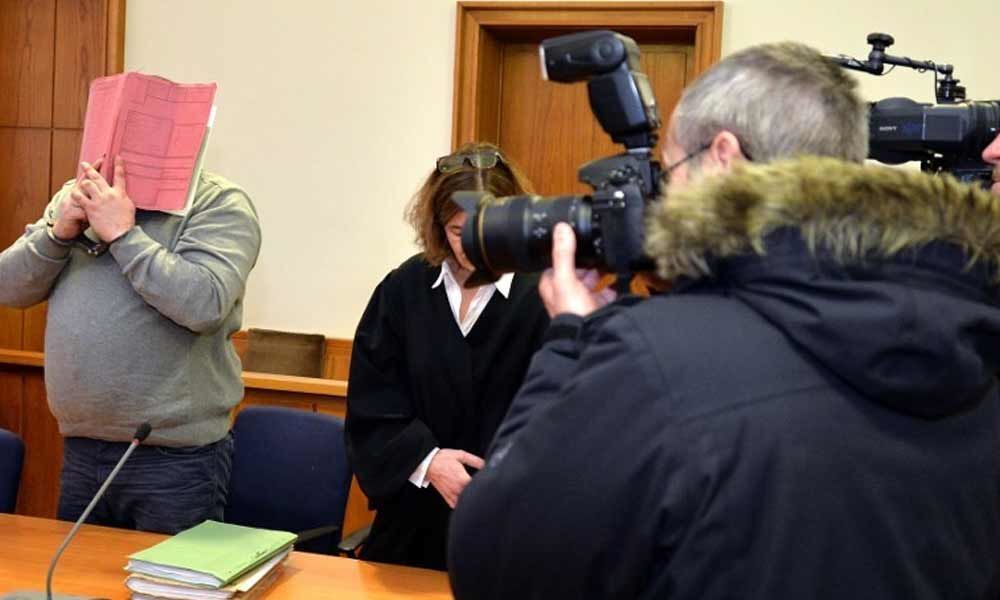Live
- A Guide to Temperature and Humidity Standards in Data Center Server Rooms
- Gadwal collector briefs on details of voters
- Jupally Krishna Rao takes part in Alampur rallu
- Bharath Prasad files 3rd Nomination
- Baisakh Month: A Time of Auspicious Beginnings and Sacred Festivals
- Oust BJD govt for overall development, says Shah
- Unveiling the Hidden Gems: Surprising Health Benefits of Garlic Peels
- Overcoming Sleep Struggles: A Comprehensive Guide to a Restful Night
- RTC bus hit the auto
- MLA Kuchukula Rajesh Reddy participated in the Birappa festival
Just In

The nurse admitted to injecting patients with drugs that cause heart failure or circulatory collapse so he could then try to revive them and, when successful, shine as a saviour before the world.
BOREDOM: The man accused of being post-war Germany's most prolific serial killer was known to colleagues as a "nice guy" who did little to arouse suspicion until well into his murder spree.
With his verdict expected Thursday, prosecutors say Niels Hoegel, 42, a heavy-set, second-generation caregiver, was drunk on power over his ailing patients, whom he picked off at random out of "boredom".
Hoegel has admitted to injecting patients with drugs that cause heart failure or circulatory collapse so he could then try to revive them and, when successful, shine as a saviour before his medical peers and superiors.
The dangerous game left at least around 100 patients dead, according to the charges against him. However, police say the actual number could be more than 200. The current trial is Hoegel's third since 2015 related to the deaths at clinics where he worked.
He was found guilty in two earlier trials and sentenced to 15 years in prison, but investigators pressed on with toxicology tests on dozens more exhumed bodies.
Hoegel has admitted to committing 43 murders with certainty but said he had serious memory gaps in dozens of other instances. He offered his victims' families an apology during extensive testimony.
"If I knew a way that would help you, then I would take it, believe me," Hoegel said as his trial got underway in November.
"I am fully convinced now that I owe every relative an explanation. I am honestly sorry."
Pretty normal
Local daily Nordwest Zeitung plunged into a character study of the defendant whose crimes stunned the country.
Talking to his former teachers and classmates, "friendly", "helpful" and "fun" were words that came up again and again to describe him.
"In no way someone from the fringes", the paper quoted another person who had known him since adolescence as saying.
A teacher called him "a pretty normal student" who was more interested in football than in his classes.
Born on December 30, 1972 in the coastal town of Wilhelmshaven, Hoegel grew up in a Catholic family he described as "warm and stable".
At 16, he began training at the main hospital in his hometown as a nurse, his father's vocation. He failed to make a strong impression, but colleagues and superiors remember him as "nice" during the few years he spent at the clinic.
The image jars with what would become an alleged frenzy of killing in the years between 2000 and 2005 when he deliberately caused heart failure in several dozen patients before trying to save them, in most cases without success.
He asked two female trainee nurses he was trying to impress to watch him during one such rescue attempt, according to depositions.
Prosecutors say he was motivated by professional vanity but also, often enough, sheer "boredom".
Resuscitation Rambo
Hoegel "acted out of pride", the presiding judge who convicted him in 2015 said, adding that he "used people as pawns".
"A sad guy who gave himself God's powers," said Christian Marbach, whose grandfather was killed by Hoegel.
In a 200-page personality assessment, psychiatrist Konstantin Karyofilis said that Hoegel failed to see his patients as "individuals". Another report identified a "severe narcissistic disorder".
The "nice guy" facade shattered at a hospital in the northern city of Oldenburg, where he started working in 1999.
The clinic had a good reputation but Hoegel felt overwhelmed by the job and started drinking heavily as he sank deeper into a depression spiked with a panicky fear of his own death.
The emergency resuscitations, and the deaths, began to soar on his watch at the hospital. Hoegel gained a reputation as something of a jinx and colleagues sought to avoid working with him.
He was encouraged to move on in 2002, with a positive recommendation from management to ensure his quick departure. Despite the curious number of patient deaths under his care, no internal investigation was ever opened against him.
Hoegel, who eventually married and had a daughter, was allowed to continue the carnage in the neighbouring town of Delmenhorst, where colleagues nicknamed him "Resuscitation Rambo".
That is until he was caught in the act in June 2005. When he managed to revive a patient, he was sated but only for a few days, Karyofilis said: "For him, it was like a drug."

© 2024 Hyderabad Media House Limited/The Hans India. All rights reserved. Powered by hocalwire.com







